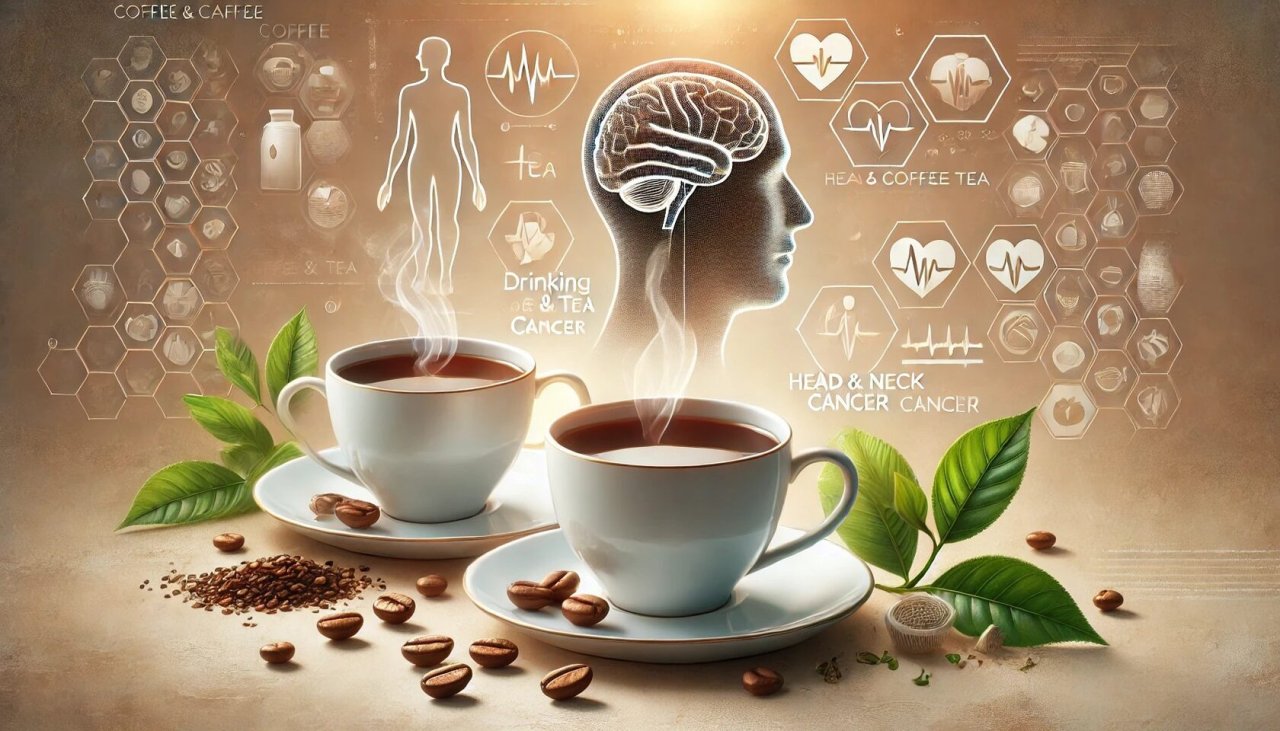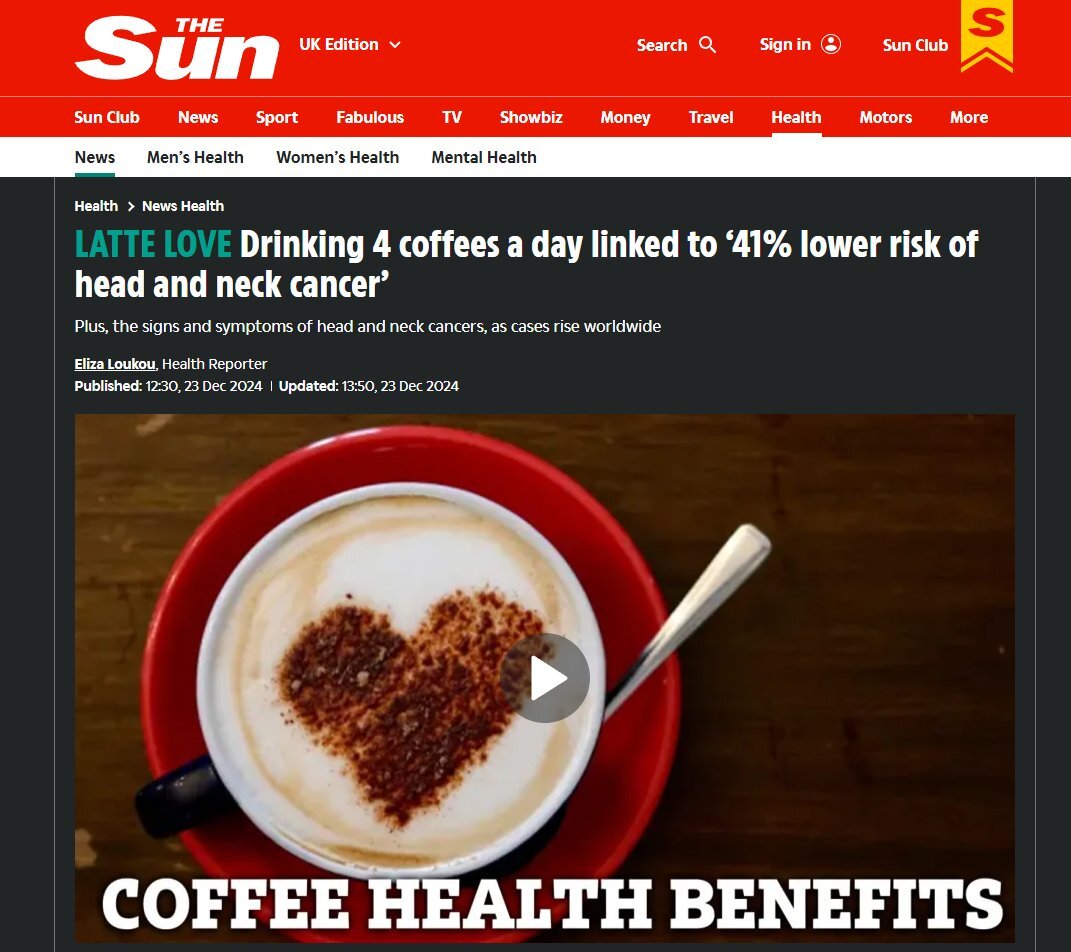Can Drinking 4 Cups of Coffee a Day Really Prevent Cancer?

On December 23, 2024, the British publication The Sun published a note titled “Consuming 4 cups of coffee a day is associated with a ‘41% reduction in the risk of head and neck cancer.'” Our team became interested in this issue and decided to verify the information.

Although the journalists do not provide a hyperlink to the original source, we managed to find it using keywords. As it turned out, they refer to a study published on the American Cancer Society website, which is a combined analysis of the International Head and Neck Cancer Epidemiology Consortium.
The information was collected using questionnaires specific to the study, including questions about socio-demographic aspects and lifestyle factors such as diet, tobacco and alcohol consumption. Data on demographic, behavioral, and clinical characteristics were included to account for potential confounding factors that could affect the accuracy of the results. Individuals with missing data on age, sex, and race/ethnicity were excluded from this analysis. Informed consent was obtained from each participant, and approval from the institutional review board was obtained from all regions where the study was conducted.
Fourteen case-control studies included information on coffee and tea consumption, and nine also collected information on decaffeinated coffee. All questionnaires were similar in that participants were asked to recall their previous consumption of caffeinated coffee, decaffeinated coffee, and tea in cups per day/week/month/year.
Cancer Statistics in Russia and Worldwide: The Scale of the Problem
Cancer remains one of the leading causes of mortality worldwide. According to data from the World Health Organization (WHO), in 2015, a record number of new cases of malignant neoplasms were recorded in Russia—589,341, of which 270,046 were men and 319,335 were women. Compared to 2014, the incidence increased by 4%, and the total number of patients registered in oncology dispensaries reached 3.4 million people. The overall prevalence rate was 2,329.8 per 100,000 population.
Globally, the cancer problem remains acute. According to the Global Cancer Observatory (GLOBOCAN), in 2018, 890,000 new cases of head and neck cancer were registered, and the number of deaths from these types of cancer reached 450,000. Projections are bleak: by 2030, the incidence may increase by 30% to 1.08 million new cases per year.
In Russia, cancer incidence is also on the rise. According to data from the Ministry of Health, from 2008 to 2018, the incidence of malignant neoplasms increased by 23.7%. In 2019, cases of head and neck cancer alone exceeded 24,000 people. In total, more than 3.76 million people in the country are registered with cancer diagnoses.
According to the book “Malignant Neoplasms in Russia in 2023 (Incidence and Mortality)” edited by A.D. Kaprin, in 2023, 674,587 new cases of cancer were detected in Russia, which is 8% more than in 2022. The incidence among men was 307,909 cases, among women — 366,678.
At the end of the year, 4.16 million patients were registered in oncology dispensaries in the country — 140,000 more than a year earlier. On average, there are 2,845 people per 100,000 Russians with a diagnosis of “malignant neoplasm.”
In 96.6% of cases, the diagnosis is confirmed morphologically, i.e., by tissue analysis of the tumor. However, for some types of cancer, this figure is lower. For example, for liver and bile duct tumors, morphological verification is confirmed in only 80.5% of cases, for pancreatic cancer — in 80.9%, and for lung tumors — in 90%.
As for the stages of the disease, cancer is most often detected at stage I — 36.3% of cases, at stage II — 24.3%, at stage III — 16.4%. In 18.9% of cases, the disease is diagnosed at stage IV, but this figure has decreased compared to 2013, when the share of late diagnoses was 21.1%.
What Really Affects Cancer Risk?
To find out whether tea and coffee consumption can indeed affect the likelihood of developing cancer, we sought expert commentary from the Doctor of Chemical Sciences, Head of the Department of Analytical and Medical Chemistry at the Faculty of Chemistry of N.I. Lobachevsky Nizhny Novgorod State University, Alexander Knyazev. According to him, the risk of developing cancer largely depends on genetic predisposition. “If there were cases of cancer in the family, the likelihood increases. There are people who don’t smoke, don’t drink, lead a healthy lifestyle, but end up with cancer — it’s genetics,” the expert noted. It is also important to consider a person’s lifestyle as a whole.
Caffeine: Friend or Foe?
Caffeine is often accused of having a negative impact on the body, but is it really that harmful? “No. It is processed in our bodies. Caffeine is chemically similar to our nitrogenous bases in DNA. The body does not perceive it as a toxin,” noted Alexander Knyazev. “Any effect depends on the dosage. You can even die from water if you drink 5 liters — it will disrupt the water-salt balance.”
The expert emphasized that caffeine itself in moderate amounts is not harmful, and its perception by the body depends on many factors: “Why, for example, is tea perceived as milder than coffee? There is also caffeine in tea, but tea contains other substances, including tannins, which soften its effect.”
Correlation or Manipulation?
According to the expert, the main problem with such studies is the subjectivity of the data. “How did they determine how much caffeine a person actually consumes? They asked: ‘Do you drink coffee?’—and the person answers: ‘Yes, a lot.’ But what does ‘a lot’ mean? One drinks three cups of espresso, another—three cups of weak tea. These are completely different things.”
There is also an important factor — antioxidants: “Tea contains antioxidants that protect against free radicals, which can indeed influence the formation of cancer cells. It turns out that tea can work the other way around — protecting the body.”
What Chemical Substances Are Contained in Coffee and Tea, and How Can They Affect the Body?
To find out which substances can affect the body, we asked Candidate of Biological Sciences, Associate Professor of the Department of Ecology at the Institute of Biology and Biomedicine of N.I. Lobachevsky Nizhny Novgorod State University, Evgeny Solomaykin. According to him, the reduction in the risk of head and neck cancer after consuming coffee may be related to its chemical composition.
“The main active component in coffee is caffeine. Caffeine is a central nervous system stimulant; it can improve concentration and alertness, elevate mood, and increase physical performance,” the expert explained.
In addition, coffee contains:
- Chlorogenic acids: “This antioxidant may help reduce inflammation and act as a neuroprotector. It can also participate in regulating blood sugar levels.”
- Terpenes (cafestol): “They can affect blood lipid levels but are mainly found in unfiltered coffee, such as espresso.”
- Coffee also contains essential oils, nicotinic acid (vitamin PP), and other components.
As for tea, its composition largely overlaps with coffee. “There is also caffeine in tea, but it also contains theanine — an amino acid that can have a relaxing effect without causing drowsiness, mitigating some of the effects of caffeine.”
Tea is also rich in the following substances:
- Catechins (EGCG): “This antioxidant is especially abundant in green tea. It has anti-inflammatory, cardioprotective, and anticancer properties.”
- Flavonoids: “They protect the body’s tissues from damage by free radicals.”
- Tannins: “These substances have an astringent taste and can positively affect digestion.”
A similar view on the issue was expressed by Candidate of Medical Sciences, Associate Professor of the Department of Internal Diseases at the Institute of Clinical Medicine of N.I. Lobachevsky Nizhny Novgorod State University, Ksenia Kolosova. According to her, tea and coffee reduce the risk of liver cancer, tumors of the female reproductive system, and colorectal cancer. In addition, coffee in reasonable doses can help prevent cardiovascular diseases in healthy people. “But, of course, coffee or tea alone is not enough for prevention. It should be part of a set of measures: leading a healthy lifestyle, giving up bad habits, and undergoing regular medical check-ups.”
What Dosages Are Safe?
“The norm is considered to be 150-400 milligrams of caffeine per day for a healthy person. Pregnant women, children, teenagers, and people with heart conditions should reduce this dose. It is important to consider not only coffee but also tea, chocolate, energy drinks, and other products containing caffeine. By the way, it is better to exclude milk additives and sweet syrups in coffee. We already consume too much sugar. It is in baked goods, sauces, and even ketchup. Sugar increases the risk of developing type 2 diabetes and negatively affects dental health,” noted the expert.
“I would also recommend not drinking coffee in the evening, as it can cause insomnia, and due to disturbed sleep — anxiety, tachycardia, increased sweating, irritability, and more.”
Conclusion
The claim that daily consumption of four cups of coffee reduces the risk of cancer is questionable. While there are studies indicating the potential benefits of coffee and tea due to their antioxidant properties, the likelihood of developing cancer is primarily determined by genetic predisposition and lifestyle.
To realistically reduce the risk of cancer, it is not enough to simply drink coffee or tea — this should be part of a set of preventive measures.
Balanced nutrition, abstaining from harmful habits, physical activity, and regular medical check-ups play an important role. Moreover, the original study cited by the journalists of The Sun does not consider several critical factors, such as the influence of harmful habits, individual metabolic characteristics, and the variation in caffeine concentration in beverages depending on the preparation method and type. It’s also important to note that caffeine is found not only in coffee or tea but also in other products, such as energy drinks, which could have skewed the study’s results.
Therefore, the claim that four cups of coffee per day has a protective effect against cancer is controversial and requires additional scientific confirmation. A much more reliable way to reduce risks is to lead a healthy lifestyle and monitor your health through preventive check-ups. In this regard, we believe that this material is mostly false.